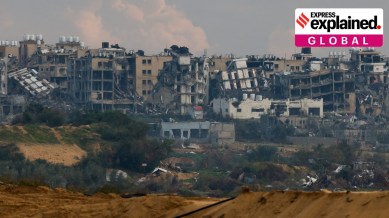Why the Israel embassy in South Korea had to take down ‘imaginary Hamas attack’ video
The 'Hamas attack' video was produced by Israel’s embassy in Seoul. Here's why they shared the video, and why they had to delete it.

Israel’s embassy in South Korea was last week forced to delete a video it had produced, depicting violence in an imaginary scenario where Seoul was being attacked by Hamas.
In the video, a young mother watching her daughter singing at a school programme looks down at her cellphone as it suddenly rings out in a loud air raid warning. Immediately after, the sounds of gunfire and explosions can be heard. In the next scene, the mother, covered in blood, is kidnapped by an armed man. She searches for her daughter, but can only see two red mittens left on the ground. The video ends with a message saying, “Imagine if it happened to you. What would you do?” and lists fatalities and other data circulated by Israel about Hamas.
The Israeli embassy in South Korea was compelled to take down the video after South Korea’s Ministry Of Foreign Affairs asked it to do so. In a statement, the foreign ministry said, “The killing and kidnapping of Israeli civilians by Hamas cannot be justified, but the Israeli Embassy’s production and distribution of a video drawing parallels to the security situation in another country was deemed inappropriate.”
Why was the video put up?
Israel’s embassy in South Korea had issued a statement via a social media post that has since been deleted, saying the video was to help South Koreans understand how Israelis feel. “We have reconstructed the horrifying terrorist incident that took place on October 7th to help South Koreans in East Asia, far away from Israel, understand the current war situation,” Akiva Tor, Israel’s ambassador in Seoul had said, in the now deleted post.
After hostilities between Israel and Hamas escalated on October 7 last year, Tor had thanked the country for its “strong statements of condemnation of the Hamas atrocities and for being a friend to Israel.”
However, in mid-October, when hundreds of protestors marched in Seoul in support of Palestine, Tor held a press conference objecting to these protests.
“Khaybar is the name of the town in which a Muslim army massacred the Jewish community in the seventh century in the Arabian Peninsula, so ‘Khaybar Khaybar YaYahud’ means ‘massacre the Jews.’ This is happening on the streets of Seoul,” Tor had said. He was referring to the word ‘Khaybar’ which protestors had been chanting. “There should be freedom to protest in Seoul, of course, but I think this is a little bit over the top,” he had said, according to a report by the newspaper The Hankyoreh in South Korea.
Apart from protests on the streets, college and university campuses in South Korea have seen debates and discussions on the Gaza war, with posters showing support for Palestine but not turning a blind eye to the actions of Hamas.
Behind the sympathy for Palestine, what role does South Korea’s history play?
For many who have thrown their support behind Palestine, the reason lies in the memories of colonial violence by Japan. Protesters have drawn parallels between their own subjugation under Japanese imperial rule and those of the Palestinians under Israel.
During Japan’s colonisation of the Korean Peninsula from 1910-1945, approximately 1,50,000 Koreans were forced to work in factories and mines in Japan during the Second World War. Thousands of Korean girls and women were forced into sexual slavery in military brothels and were subjected to sexual violence and exploitation.
How are South Korea’s ties with the Middle East?
While South Korea had condemned Hamas in October, the country has not openly supported Israel. Analysts believe that Seoul is likely to avoid taking sides in the conflict. This is because of South Korea’s growing interest in the Middle East and North Africa (MENA) to expand domestic industries.
In 2022, during a high-profile visit to South Korea, Saudi Arabia’s crown prince and prime minister, Mohammed bin Salman, secured $30 billion in bilateral deals with Seoul. Saudi Arabia has denounced Israel’s response in the ongoing conflict with Hamas, and has drawn attention to the high civilian death toll in Gaza.
South Korea has also been looking at the UAE for economic cooperation. According to a Reuters report, the United Arab Emirates plans to maintain diplomatic ties with Israel despite the mounting toll in Gaza, and hopes to have some moderating influence over the Israeli campaign while safeguarding its own interests.